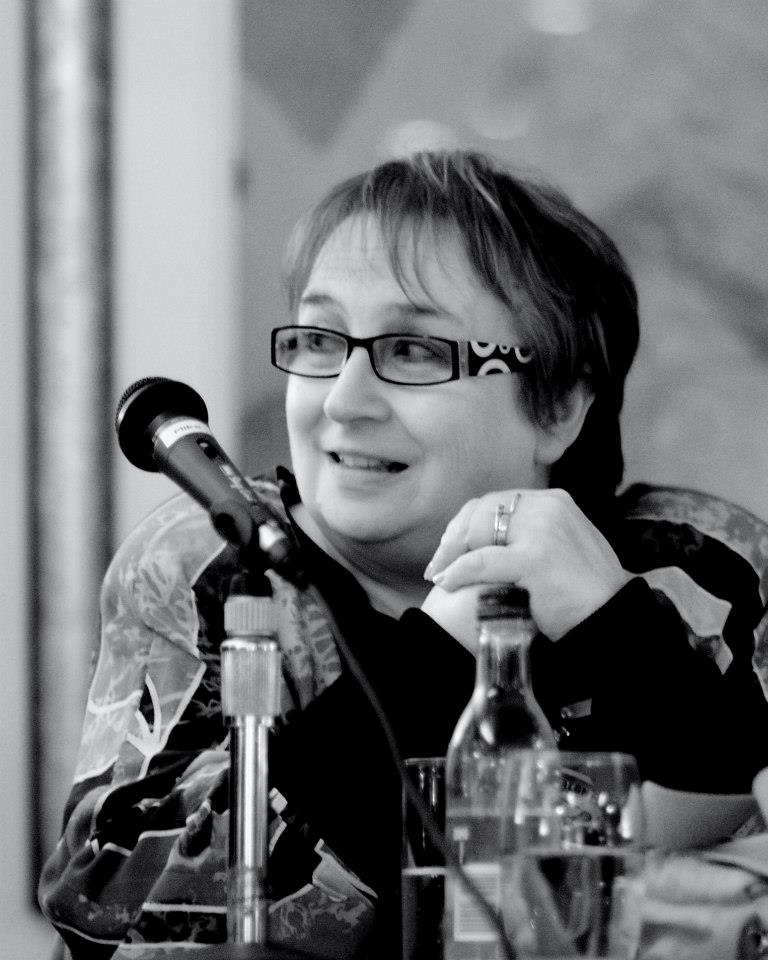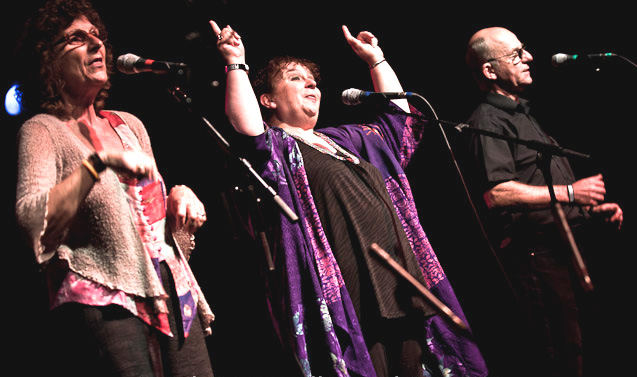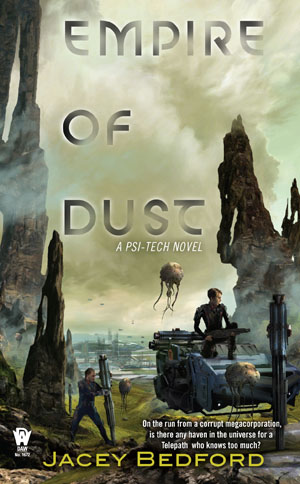Not that she’s been resting on her laurels in the other side of her life either. Empire of Dust, Jacey’s debut novel, is a space opera set in a universe where large corporations and their telepathic, implant-addicted psi-tech agents are locked in a battle for resources across the galaxy. With Empire of Dust due out on 4th November through DAW, here’s Jacey’s take on the similarities between music performance and writing – and what she’s learned from each…

Lessons Learned and Applied
The Parallels Between Singing and Writing
I got my first writing break via the hugely talented, Nebula-winning writer, Elizabeth Ann Scarborough, a friend of a (musical) friend from Washington State and – as it turns out – an Artisan fan. Annie (bless her) offered to read my work, because she figured if I was used to entertaining an audience, I probably had a bit of gumption when it came to writing too. That was the first time I’d actually compared notes between the two halves of my life, but what she said made a lot of sense. This is how I see it…
Feedback
When you write a book, feedback is slow. From the first once-upon-a-time to the book being out there on bookstore shelves can take years. When you’re on a stage, feedback is instant. Your audience votes with applause and laughter, or if you really suck it votes with its feet. After the show it votes with its wallet at the CD sales stand. Obviously, if something works on stage you keep it in the act. If it doesn’t, you drop it. It may take a lot longer to incorporate feedback into your writing, so you have to try and think ahead and to a certain extent second-guess your audience. What will they take to their hearts and what won’t they? This is where being a member of a good critique group or attending an event like Milford really helps.
Style
I don’t write songs. It takes me 120,000 words to explain what my husband, Brian Bedford, can write in four verses. He’s Artisan’s song writer. His lyrics need to be heard. In transmitting that song to an audience it’s important that we, as singers, don’t stand in front of it. The audience should hear the song, feel it, not be drawn to an examination of singing technique or the clarity of any one voice. If we’re doing our job right, the technique should be invisible. We’re not saying, “Listen to me,” we’re saying, “Listen to the song.”
Ditto with writing, especially genre writing (if you write literary or experimental fiction, all bets are off). Purple prose, metaphor and alliteration will only take you so far. You should be telling the story. The writing should be clean and elegant, the words apposite. The technique should be invisible. The reader should be able to immerse themselves in the story, not in your word choices.

Plot
When you’re putting together a set of songs for a concert you need a beginning a middle and an end. You’re creating a sustainable entertainment arc. Your ‘wake-up’ starter-song should grab your audience’s attention and tell them, “This is what you can expect, so listen-up!” The end should be a big finish to fulfil your promise and raise the roof. Between those two bookends you need a succession of carefully chosen contrasts, each one building on the last; tension and release. If you juxtapose a lively song with an emotional melodic one full of lush harmonies then both songs benefit from the comparison. If you follow a tense, dramatic song (often your mid-point in the set) with a clever little ditty, it gives the audience chance to breathe again, but without losing their attention. Between the songs, you chat to them – little stories to lead from one song to the next while setting the right mood. If they call for it, and they always do, you can give them an encore, something soft and warm to send them home smiling, blissed out.
When writing it’s often a good plan to start in the middle of the action (in medias res), and vary the pace building in an escalating series of events (reversals and pinch points) until you reach a dramatic mid-point, the fulcrum on which the lever of your story balances. A series of transitions holds it all together, just like your links between songs. Then you head for the no-holds-barred finale, probably via another big reversal and pinch point or plot twist. But don’t just stop there – follow it with a resolution. In other words, give them an encore to send them home happy.
Attention Span
All the time, whether singing or writing, you have to hold your audience’s attention. If you turn away and stop to tie your shoelace, literally or figuratively, you’ve lost them. You don’t need to keep up a frenetic pace from start to finish, of course, but you do need to keep up a level of interest, and there should be dramatic tension running through it all. They have to want to turn the page, listen to the next song.
Characters
Your onstage persona is – like the advert says – you, but on a good day. Slightly larger than life, witty, warm, human, humane. Your audience should like you. That’s what will keep them coming back.
Your reader has to care about your characters, too. They have to want them to succeed in their endeavour, find true love, marry Princess Buttercup, drop the ring into the fires of Mount Doom and return safely, or stick it to a totalitarian state. There’s nothing that will get a book hurled against a wall more quickly than if your characters are unremitting arseholes or dull as ditchwater. I don’t care what happens to these characters – the eight deadly words you never want to hear from your readers.
Reviews
Afterwards there are reviews. We all hope for good ones: Good reviews are great. Not so good reviews? Well, you learn from them as well, but though comments in a review may be a consideration when you start the next project, plan the next book, do the next gig, make the next CD, at the end of the day a review is just one person’s opinion. Read it and move on. Your writing and your music come from the heart. They are not just what you do, they are what you are. Trust yourself.

Jacey Bedford is a British author published by DAW. Empire of Dust, the first book in her Psi-tech Universe, launches on 4th November and the sequel, Crossways, is due in 2015. You can find out more from her website (www.jaceybedford.co.uk), or her blog, Tales from the Typeface.
In another life, she sang with a cappella trio Artisan (www.artisan-harmony.com) from 1985 to 2005, playing gigs and festivals all over the UK, Canada, the USA, parts of Europe, Australia and even Hong Kong. Completed by Hilary Spencer and Brian Bedford, the band’s career spans twelve CDs and a DVD. In 2015, Artisan hit the road again for a series of reunion gigs all over the UK, ten years after Jacey officially hung up her tonsils. She keeps her connections to the music world by running a booking agency for other folk musicians – Jacey Bedford Tour Management (www.jacey-bedford.com).
